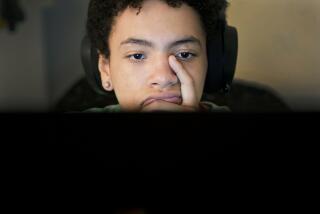Online and Off Course
- Share via
If nothing else, Morgan Spurlock, the chap who dined exclusively on fast-food fare for 30 excruciating days and then made a documentary of it, proved that just because we can do something does not mean we should.
There are some things in life that have a certain “drive-by” appeal but, upon closer inspection, are not the best choice. I think the same will eventually be proved true in the mad rush to find the equivalent of “fast food” in American education, and not only at the college and graduate levels. Reports are that the Internet’s Virtual High School is available for sign-on.
There is a place for all kinds of online education. (I especially like the driver training school courses.) Some of my colleagues in higher education have worked very hard to offer solid material and credible pedagogy in their online courses, and I do not mean to categorically discredit their efforts. I doubt, however, that I will ever overcome my abiding preference for what was once described, in reference to the legendary president of Williams College, as the best possible education: “Mark Hopkins on one end of a log, with a student on the other.” The distance between that intellectual intensity and a learning relationship illuminated only by a computer screen is immense.
With a virtual high school comes the real challenge of determining what should be included in the basic education of our citizens. Aside from the fact that I could probably make the football team, I am not overwhelmed with the promise of such a school.
So, let’s see if I have this right. Across the United States, Dan and Sue can either get up early and arrive at school by 8:15 a.m., staying until 3 p.m. or so, raising their hands to participate, intersecting with diverse people and their interests, experiencing successes and addressing setbacks, all the while developing relationships with mature, learned adults who hold them accountable. Or, they can stay home, dial up and phone it in. For many, it will be the rough equivalent of choosing a balanced meal or driving through the fast-food outlet of choice.
My own high school experience was agonizing and thrilling, sometimes before the end of first period, but I would not trade it for anything.
When I was 16, full of raging hormones and with a certain James Dean-esque swagger, if left to my own choices I might have been quite intrigued with school unencumbered by attendance policies. I am sure Ferris Bueller would have greeted it with great delight. School was not easy, but then it was not supposed to be easy, or fast or even efficient.
Maybe I am overreacting as I cringe at what virtual high school students will miss as they zip through a college prep curriculum on their way to virtual university, followed, inevitably, by entry to -- alas -- the real world. But I don’t think so.
The bright and the average probably will avail themselves of this new invention. They will graduate from a school they never saw, educated by teachers they never met, with a competence I fear a harsh world will judge, in a word, harshly.
I know education can be rendered effectively in many different forms. Maybe virtual high school is an idea whose time has come. But I am compelled to ask the Spurlock question: Just because we can do it, should we?
Great discernment is required if the Internet becomes the academic pipeline of choice, and discernment on the Internet, unlike creativity and profitability, is in short supply.






